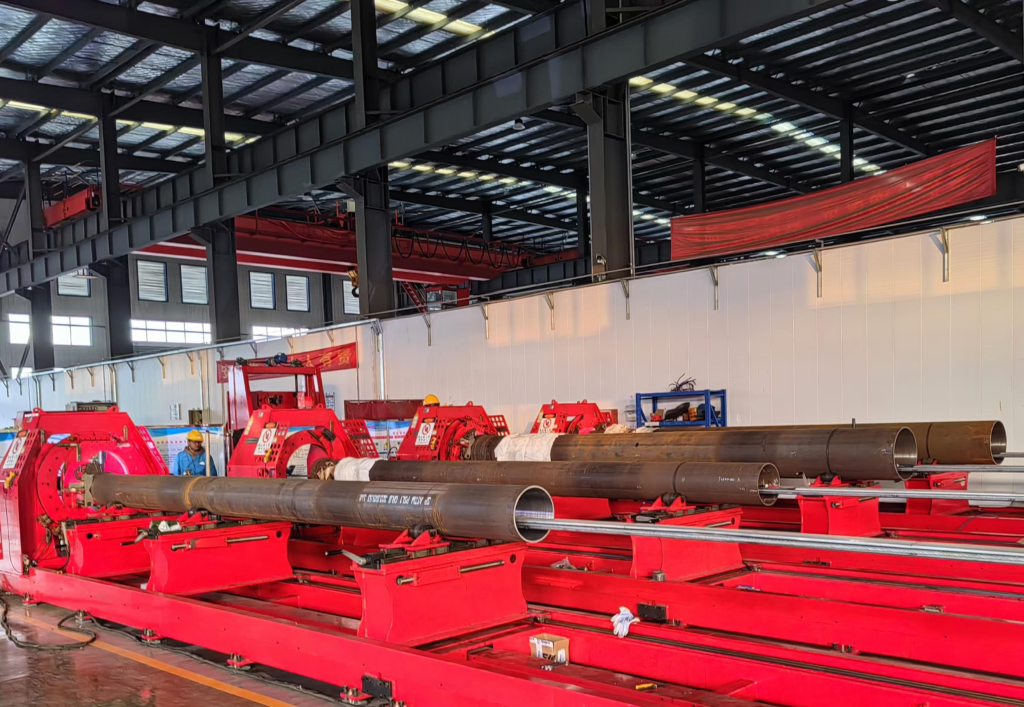Manufacturing CRA Clad and Lined Pipes Under API 5LD: From Cladding to Inspection
The API 5LD pipe manufacturing process plays a vital role in delivering safe, high-performance pipelines for corrosive environments. Whether it’s a CRA clad or lined pipe, the production steps defined by API 5LD ensure structural strength, corrosion resistance, and compliance with oil and gas industry expectations.
At FNS (Nanjing) Surface Engineering Technology Co., Ltd, our advanced equipment and rigorous quality controls allow us to manufacture pipes that meet or exceed API 5LD specifications from start to finish.
CRA Cladding Techniques in the API 5LD Pipe Manufacturing Process
A key element in the API 5LD pipe manufacturing process is the bonding of a corrosion-resistant alloy (CRA) to a carbon or low-alloy steel base. API 5LD recognizes several CRA application techniques, each suitable for different service and cost requirements:
Hot-Roll Bonding
- CRA and base materials are rolled together under high heat
- Produces a metallurgical bond with uniform CRA layer
- Common for thicker pipes and high-pressure applications
Explosion Bonding
- Uses shock waves to instantly bond CRA to base steel
- Preserves alloy chemistry and mechanical properties
- Ideal for complex or high-integrity clad plates
Weld Overlay
- CRA material applied by automated welding processes (e.g., GTAW)
- Offers precise layer control and flexibility in diameter
- Preferred for small-batch or high-spec projects
Mechanical Lining
- CRA liner inserted and mechanically expanded into base pipe
- No metallurgical bond, but cost-effective in moderate conditions
Each technique requires exacting process control. At FNS, our explosion bonding line and GTAW overlay systems are operated under continuous inspection as part of our standard API 5LD pipe manufacturing process.

CRA clad steel pipe under API 5LD manufacturing process with visible cladding and weld zones
Pipe Forming and Seam Welding
Once CRA bonding is completed, the pipe is formed and welded to its final shape—typically longitudinally welded per API 5LD.
Forming and Welding Steps:
- Plates or coils are rolled into cylindrical form
- Longitudinal seams are joined via Submerged Arc Welding (SAW) or Gas Tungsten Arc Welding (GTAW)
- Weld seams are ground and inspected
During this stage of the API 5LD pipe manufacturing process, both internal and external welds are monitored for heat input and fusion depth to protect the CRA layer and base metal integrity.
Post-Weld Heat Treatment (PWHT)
API 5LD requires heat treatment following welding or bonding to:
- Relieve residual stress
- Refine grain structure
- Restore corrosion resistance, especially in the CRA zone
PWHT is an essential part of the API 5LD pipe manufacturing process, especially for explosion-bonded or weld-overlayed products. FNS uses multi-zone controlled furnaces to ensure precise thermal profiles.
Surface Finishing and Dimensional Control
After heat treatment, pipes undergo finishing and dimensional checks to ensure compliance with API 5LD tolerances.
Key steps include:
- Surface Cleaning: Removal of scale and oxide from CRA surfaces
- CRA Thickness Inspection: Using ultrasonic gauging or mechanical measurement
- Straightness and Ovality Check: To avoid misalignment during field installation
- End Preparation (Beveling): For welding compatibility
These finishing procedures are integrated into the API 5LD pipe manufacturing process to maintain high-quality assembly and weldability in the field.
Non-Destructive Testing in API 5LD Pipe Manufacturing
Non-destructive testing (NDT) is essential to validate bond integrity and detect internal or surface defects.
Standard NDT methods per API 5LD include:
- Ultrasonic Testing (UT): Detects delamination and bonding voids
- Radiographic Testing (RT): Evaluates weld penetration and porosity
- Liquid Penetrant Testing (PT): Highlights surface cracks on CRA surfaces
NDT is performed at multiple stages of the API 5LD pipe manufacturing process, including after cladding, welding, and final finishing.
Destructive Testing and Certification
For comprehensive quality assurance, API 5LD also requires destructive testing on sample pipes from each lot:
- Shear Tests: Confirm CRA bond strength
- Bend Tests: Ensure ductility of CRA layer and weld seams
- Macro & Micro Examinations: Visualize CRA layer uniformity, bonding quality, and heat-affected zones
At FNS, destructive test results are tied to specific pipe IDs through a digital traceability system, forming a key part of our API 5LD pipe manufacturing documentation.
Final Inspection, Marking, and Documentation
The last phase in the API 5LD pipe manufacturing process involves:
- Full visual inspection of pipe body and ends
- Final dimensional verification
- Application of permanent markings per API 5LD:
- Pipe grade
- CRA material
- Manufacturing date
- Manufacturer code
A complete documentation package is issued with each delivery, including:
- MTC (Mill Test Certificate)
- NDT Reports
- Heat Treatment Logs
- Process Route Map
Final Thoughts
The API 5LD pipe manufacturing process is a highly engineered sequence of operations that transforms raw materials into certified, corrosion-resistant pipe systems ready for the world’s toughest environments.
At FNS (Nanjing) Surface Engineering Technology Co., Ltd, we integrate precision equipment, skilled technicians, and strict process controls to deliver clad and lined pipes that meet or exceed all API 5LD requirements.
In the next article, we’ll cover the mechanical and corrosion testing defined by API 5LD, including test methods and acceptance criteria.
Related Articles:
← Key Technical Requirements of API 5LD: Materials, Dimensions, and Tolerances
→ What is API 5LD? Clad & Lined Steel Pipes for Corrosion‑Resistant Service


